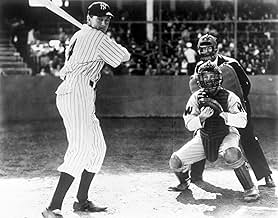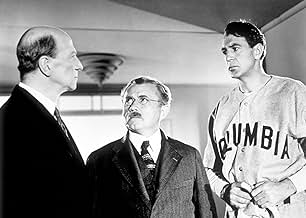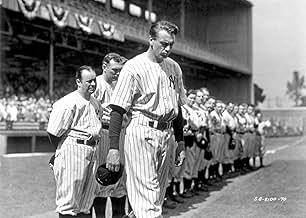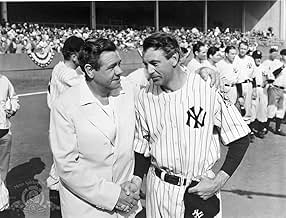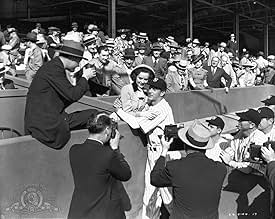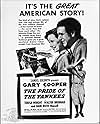IMDb-BEWERTUNG
7,6/10
12.616
IHRE BEWERTUNG
Die Geschichte über das Leben und die Karriere des berühmten Baseballspielers Lou Gehrig.Die Geschichte über das Leben und die Karriere des berühmten Baseballspielers Lou Gehrig.Die Geschichte über das Leben und die Karriere des berühmten Baseballspielers Lou Gehrig.
- 1 Oscar gewonnen
- 5 Gewinne & 10 Nominierungen insgesamt
Ludwig Stössel
- Pop Gehrig
- (as Ludwig Stossel)
Bob Meusel
- Robert W. Meusel
- (as Robert W. Meusel)
Empfohlene Bewertungen
It's not often that I see such a great movie where one of my heroes portrays another, but, this is certainly one of them. Gary Cooper portraying Sergeant Alvin C. York is another.
Gary Cooper does a magnificent job as Henry "Lou" Gehrig despite being two years older, for starters; and, several years older (41 playing someone in their twenties) near the beginning of the movie while at Columbia University.
Walter Brennan is brilliant as always! Teresa Wright is stunning! Besides Babe Ruth, until watching this recently on TCM, I didn't realize that other New York Yankees' teammates of Gehrig's were also in the movie as themselves - Bob Meusel; Bill Dickey; and, some others. This made the movie that-much-more enjoyable this time around! It falls into the category of movies that can be watched over and over again.
I also like the 'innocence' of a movie like this as it can be viewed by everyone in the family - from small children who love real-life heroes to the elderly who remember these heroes from real-life.
Although there are a few biographical errors about Lou Gehrig's life...overall, the movie is fantastic, even if you're not a real baseball fan! If you are a real baseball fan...this movie is a must-see!
Gary Cooper does a magnificent job as Henry "Lou" Gehrig despite being two years older, for starters; and, several years older (41 playing someone in their twenties) near the beginning of the movie while at Columbia University.
Walter Brennan is brilliant as always! Teresa Wright is stunning! Besides Babe Ruth, until watching this recently on TCM, I didn't realize that other New York Yankees' teammates of Gehrig's were also in the movie as themselves - Bob Meusel; Bill Dickey; and, some others. This made the movie that-much-more enjoyable this time around! It falls into the category of movies that can be watched over and over again.
I also like the 'innocence' of a movie like this as it can be viewed by everyone in the family - from small children who love real-life heroes to the elderly who remember these heroes from real-life.
Although there are a few biographical errors about Lou Gehrig's life...overall, the movie is fantastic, even if you're not a real baseball fan! If you are a real baseball fan...this movie is a must-see!
In today's era of greedy athletes and their employers, the story of Lou Gehrig seems almost quaint. Here's a young man who by all accounts was selfless, kind-hearted, and rather introverted. And, of course, it didn't hurt that he was also a very good baseball player too. Put him on a lineup card today and he might not be the same player. Up until a few years ago, Gehrig's record of 2,130 consecutive games played was a record, a record that many thought would stand forever. For 16 years he was in the lineup as the Yankees' first baseman, never asking out for any reason. That alone should show you how special a person Gehrig was.
This biography is pretty straightforward. Unlike many of its kind, it doesn't show its protagonist somehow succeeding against all odds. Gehrig didn't have an abusive mother, he wasn't beaten up by kids at school, he wasn't learning-disabled, he didn't have attention-deficit disorder, he didn't come from abject poverty. He was simply a son in a working-class, immigrant family, as many were during the early decades of this century. And that's why Gehrig is so special to so many people - he symbolises their own hopes.
Gary Cooper is aces as Gehrig, and Teresa Wright is wonderful as his wife, Eleanor. If there's anything imperfect about the movie, it's that it is...well, a little predictable. That's something biopics can't avoid, of course, so it's no big problem. But even if most of the film doesn't impress you, the final speech at Yankee Stadium - when Gehrig was suffering visibly from the disease that would eventually be named after him - will move you past tears. And even better, when Gehrig's done his brief speech, he walks offscreen. If that movie were written today, he'd play another game and hit a game-winning home run. It's this film's honesty and sincerity that win you over.
This biography is pretty straightforward. Unlike many of its kind, it doesn't show its protagonist somehow succeeding against all odds. Gehrig didn't have an abusive mother, he wasn't beaten up by kids at school, he wasn't learning-disabled, he didn't have attention-deficit disorder, he didn't come from abject poverty. He was simply a son in a working-class, immigrant family, as many were during the early decades of this century. And that's why Gehrig is so special to so many people - he symbolises their own hopes.
Gary Cooper is aces as Gehrig, and Teresa Wright is wonderful as his wife, Eleanor. If there's anything imperfect about the movie, it's that it is...well, a little predictable. That's something biopics can't avoid, of course, so it's no big problem. But even if most of the film doesn't impress you, the final speech at Yankee Stadium - when Gehrig was suffering visibly from the disease that would eventually be named after him - will move you past tears. And even better, when Gehrig's done his brief speech, he walks offscreen. If that movie were written today, he'd play another game and hit a game-winning home run. It's this film's honesty and sincerity that win you over.
Being a lifelong Yankee fan this movie is my all time favorite. At times it can be a bit "hokey", but that is part of the charm. Even though you know the eventual fate of Lou Gehrig you cant help feeling that somehow he would get better.
My favorite scene was after his marriage to Eleanor and they were in the car driven by Walter Brennan heading to Yankee Stadium. When the motorcycle cop pulled them over for speeding. It was so "campy" but I loved it.
This movie hit all the emotions you can have! I dare anyone to tell me that after his farewell at Yankee Stadium they didn't get a lump in their throat.
My favorite scene was after his marriage to Eleanor and they were in the car driven by Walter Brennan heading to Yankee Stadium. When the motorcycle cop pulled them over for speeding. It was so "campy" but I loved it.
This movie hit all the emotions you can have! I dare anyone to tell me that after his farewell at Yankee Stadium they didn't get a lump in their throat.
The only reason I don't give this film a perfect 10 is that I think Gary Cooper was a bit too old to be playing Lou Gehrig as a youth. Cooper was 41 when Pride of the Yankees was made. He was two years older than Lou Gehrig actually was.
While not terribly convincing as a college age Gehrig at Columbia University, the part of Gehrig grew into Cooper as Gehrig aged cinematically. And of course his recreation of Lou Gehrig's farewell to baseball got him an Oscar nomination.
Henry Louis Gehrig, child of German immigrants who grew up in the Yorkville section of Manhattan, was arguably the greatest first baseman baseball has ever known. He certainly has very few competitors for the honor. His famous record of 2130 consecutive games was bettered about a decade ago by Cal Ripken, but he still holds the major league record for lifetime grand-slam home runs, 23 and the American League RBI record for a single season, 184. He is one of a select group of ballplayers to have won the Triple Crown, he did that in 1934. His lifetime batting average of .340 is only topped by a handful.
He was as writer Frank Graham put it, baseball's "quiet hero." Until he was forced from baseball by the disease he gave his name to Gehrig played second fiddle to the flamboyant Babe Ruth and then to a graceful rookie named Joe DiMaggio.
The facts of Gehrig's life are somewhat jumbled in this film for dramatic coherency, but the essence of his character is brought out in the script by Paul Gallico. In fact Gallico wrote himself into the film as sportswriter Sam Blake as played by Walter Brennan.
Gary Cooper and Lou Gehrig and Teresa Wright as Eleanor Twitchell Gehrig both received Oscar nominations for their portrayals.
It should also not be forgotten that Lou Gehrig was a German American and I believe one of the reasons the film was made was that at that time we were fighting Germany. The German American Bund had its following and very much so in Lou Gehrig's Yorkville neighborhood. German Americans certainly had other and better role models than the Bund.
I remember as a lad going to Yankee old-timers games and there was always a moment of reverential silence when the Yankee widows, Claire Hodgson Ruth and Eleanor Twitchell Gehrig were always introduced. Both survived their husbands by many years.
In fact when Teresa Wright died this past year when the roll call of former Yankees who had passed on her name was read out among all the ballplayers. It was a fitting tribute to a great actress and a woman who didn't know a thing about baseball before she did this film, but became a devoted fan afterward. I guess that was her private tribute to Lou Gehrig.
There is still no cure for amytrophic lateral sclerosis or now known as Lou Gehrig's Disease. A lot of other noted persons have passed on from it, Jacob Javits, David Niven, Ezzard Charles, Dennis Day and former Vice President Henry A. Wallace. Still we can hope for a dedicated and inspired scientist to find a cure.
Until then we have this inspirational movie and Lou Gehrig's inspired and remembered life.
While not terribly convincing as a college age Gehrig at Columbia University, the part of Gehrig grew into Cooper as Gehrig aged cinematically. And of course his recreation of Lou Gehrig's farewell to baseball got him an Oscar nomination.
Henry Louis Gehrig, child of German immigrants who grew up in the Yorkville section of Manhattan, was arguably the greatest first baseman baseball has ever known. He certainly has very few competitors for the honor. His famous record of 2130 consecutive games was bettered about a decade ago by Cal Ripken, but he still holds the major league record for lifetime grand-slam home runs, 23 and the American League RBI record for a single season, 184. He is one of a select group of ballplayers to have won the Triple Crown, he did that in 1934. His lifetime batting average of .340 is only topped by a handful.
He was as writer Frank Graham put it, baseball's "quiet hero." Until he was forced from baseball by the disease he gave his name to Gehrig played second fiddle to the flamboyant Babe Ruth and then to a graceful rookie named Joe DiMaggio.
The facts of Gehrig's life are somewhat jumbled in this film for dramatic coherency, but the essence of his character is brought out in the script by Paul Gallico. In fact Gallico wrote himself into the film as sportswriter Sam Blake as played by Walter Brennan.
Gary Cooper and Lou Gehrig and Teresa Wright as Eleanor Twitchell Gehrig both received Oscar nominations for their portrayals.
It should also not be forgotten that Lou Gehrig was a German American and I believe one of the reasons the film was made was that at that time we were fighting Germany. The German American Bund had its following and very much so in Lou Gehrig's Yorkville neighborhood. German Americans certainly had other and better role models than the Bund.
I remember as a lad going to Yankee old-timers games and there was always a moment of reverential silence when the Yankee widows, Claire Hodgson Ruth and Eleanor Twitchell Gehrig were always introduced. Both survived their husbands by many years.
In fact when Teresa Wright died this past year when the roll call of former Yankees who had passed on her name was read out among all the ballplayers. It was a fitting tribute to a great actress and a woman who didn't know a thing about baseball before she did this film, but became a devoted fan afterward. I guess that was her private tribute to Lou Gehrig.
There is still no cure for amytrophic lateral sclerosis or now known as Lou Gehrig's Disease. A lot of other noted persons have passed on from it, Jacob Javits, David Niven, Ezzard Charles, Dennis Day and former Vice President Henry A. Wallace. Still we can hope for a dedicated and inspired scientist to find a cure.
Until then we have this inspirational movie and Lou Gehrig's inspired and remembered life.
A lot of non-baseball fans still liked this movie a lot, and that's probably because it's more about a nice guy than it is about a ballplayer. New York Yankee great Lou Gehrig is the subject. Gehrig was often in the shadow of the great Babe Ruth, but was tremendous player in his own right and a far better human being.
It's tough to find many nicer movies than this one: a totally inoffensive, sentimental and old- fashioned film about a super-nice guy, played by a popular actor: Gary Cooper. Except for one sportswriter, there were no villains or nasty people in this movie.
Teresa Wright plays "Eleanor Twitchell," who becomes Gehrig's wife and Walter Brennan plays sportswriter and friend, "Sam Blake." The real Babe Ruth played himself, which was nice to see.
Even though Gehrig died at a fairly young age of a disease now named after him, overall this was a feel-good movie of the highest sort. This was so nice a story that even the cynical critics dared not criticize it. It leaves you with tears in your eyes at the end.
It's tough to find many nicer movies than this one: a totally inoffensive, sentimental and old- fashioned film about a super-nice guy, played by a popular actor: Gary Cooper. Except for one sportswriter, there were no villains or nasty people in this movie.
Teresa Wright plays "Eleanor Twitchell," who becomes Gehrig's wife and Walter Brennan plays sportswriter and friend, "Sam Blake." The real Babe Ruth played himself, which was nice to see.
Even though Gehrig died at a fairly young age of a disease now named after him, overall this was a feel-good movie of the highest sort. This was so nice a story that even the cynical critics dared not criticize it. It leaves you with tears in your eyes at the end.
Wusstest du schon
- WissenswertesReleased just 17 months after Lou Gehrig's death.
- PatzerAs Gehrig (Cooper) is doing his homework at Columbia, he writes with his right hand. Whilst Gehrig batted and threw left-handed, like many lefties of the era (perhaps because of "correction" in school), he wrote with his right hand.
- Zitate
[last lines]
Lou Gehrig: [his farewell speech]
Lou Gehrig: Today, I consider myself the luckiest man on the face of the earth... play ball!
- Crazy CreditsOpening credits acknowledgment: Appreciation is expressed for the gracious assistance of Eleanor Gehrig (as Mrs. Lou Gehrig) and for the cooperation of Ed Barrow (as Mr. Ed Barrow) and the New York Yankees arranged by Christy Walsh.
- Alternative VersionenA colorized version is available.
- VerbindungenFeatured in Diamonds on the Silver Screen (1992)
- SoundtracksTake Me Out to the Ball Game
(1908) (uncredited)
Music by Albert von Tilzer
Played during the opening credits and often in the score
Top-Auswahl
Melde dich zum Bewerten an und greife auf die Watchlist für personalisierte Empfehlungen zu.
Details
- Erscheinungsdatum
- Herkunftsland
- Sprache
- Auch bekannt als
- Idolo, amante y héroe
- Drehorte
- Produktionsfirma
- Weitere beteiligte Unternehmen bei IMDbPro anzeigen
- Laufzeit
- 1 Std. 27 Min.(87 min)
- Farbe
- Seitenverhältnis
- 1.37 : 1
Zu dieser Seite beitragen
Bearbeitung vorschlagen oder fehlenden Inhalt hinzufügen


